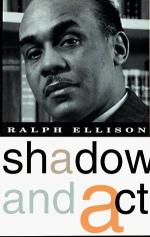
|
| Name: _________________________ | Period: ___________________ |
This test consists of 15 multiple choice questions and 5 short answer questions.
Multiple Choice Questions
1. Where and when is "The World and The Jug" published?
(a) Mississippian, 1967 and 1968.
(b) New York Times, 1965.
(c) Paris Review, 1966.
(d) New Leader, 1963 and 1964.
2. Who is Stanley Edgar Hyman?
(a) The prominent Negro intellectual who wrote "Santa Claus is Black."
(b) A lyricist and comedian in the 1930's.
(c) A scholar who wrote on the relationship between Negro literature and folklore.
(d) Ellison's uncle who has a good sense of humor.
3. What type of jug does Ellison say Howe imagines Negro people to be in?
(a) Jug of beer in which they are drowning.
(b) Steel jug waiting for a black messiah to come and blow off the cork.
(c) Empty jug with no way out.
(d) Heavy jug that takes two men to lift it.
4. What assumption does Ellison start with when writing about Negro persons?
(a) Men with black skins are unquestionably human.
(b) Only he, as a Negro writer, can find truth and beauty in their lives.
(c) They are his responsibility to explain.
(d) His task as a writer is to save them from the white world.
5. How many children are in Stephen Crane's birth family?
(a) 1.
(b) 20.
(c) 2.
(d) 14.
6. Who is Irving Howe?
(a) White liberal writer from New York City.
(b) Pseudonym for Richard Wright.
(c) Negro professor from Mississippi University.
(d) Hispanic Indian man who met Ellison in a bar.
7. What does Wright do at age four?
(a) Makes a speech at church.
(b) Begins to read.
(c) Plays the piano.
(d) Sets the house on fire.
8. Who is Richard Wright to Ellison?
(a) Hero and the mentor of all Ellison's work.
(b) Source of Ellison's inspiration and success.
(c) Friend for whose magazine he wrote his first book review and short story.
(d) Spiritual father who nurtured and guided Ellison's writing.
9. What does Mark Twain do with the character of Jim that breaks through the black face minstrel tradition?
(a) Jim is stereotypical and boring.
(b) Jim's very serious and not at all fun.
(c) Jim performs black face without the paint.
(d) He's a complex, dignified and very human person.
10. What does Ellison say the greatest difficulty for the Negro writer is?
(a) Capture the Negro speech idiom and put it down on paper.
(b) Reveal what he truly feels rather than serving up what Negroes are supposed to feel.
(c) Find a subject worthy of his time and effort.
(d) Get someone to publish him because most of the publishers were white.
11. What does the phrase "to finger its jagged grain and to transcend it" refer to?
(a) To climb great mountains.
(b) The power of the blues.
(c) To walk the razor's edge of reason.
(d) The complexity of writing fiction.
12. Falkner writes exclusively of the southern experience yet Ellison believes him to be addressing what?
(a) Northern Negro experience.
(b) Effect of war upon culture.
(c) Nature of man.
(d) Inevitable rise and fall of every civilization.
13. Who is Ellison named after?
(a) Ralph Roosevelt Ellison.
(b) Ralph Winston Ellison.
(c) Ralph Waldo Emerson.
(d) Ralph Kramden.
14. What type of literature does Ellison believe Wright's novel "Black Boy" is?
(a) Work of fiction.
(b) Weapon against prejudice and injustice.
(c) Autobiography.
(d) Sociological case history.
15. What folk tradition does Ellison believe the black face figure grows out of?
(a) Africa.
(b) West Indies.
(c) Europe.
(d) America.
Short Answer Questions
1. What does Ellison believe writing is?
2. What are the three major section of the "Primer for White Folks?"
3. What book does Hemingway believe all modern American fiction sprang from?
4. How does Ellison describe Wright's autobiography "Black Boy?"
5. How does Ellison describe the writer Malraux?
|
This section contains 625 words (approx. 3 pages at 300 words per page) |

|




